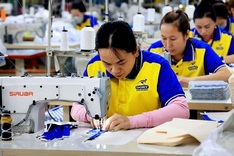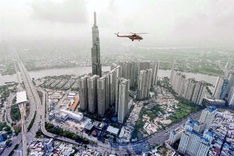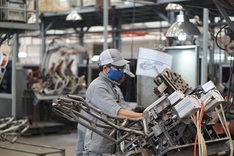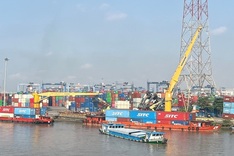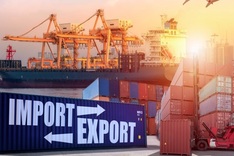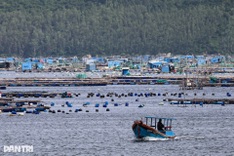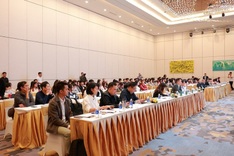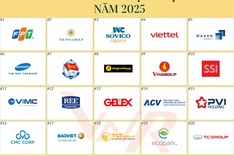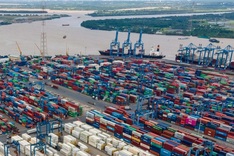Vietnam Shipbuilding Industry Corporation (Vinashin) is worth an over VND 90 trillion but is in about VND 80 trillion of debt according to a government official.
The restructuring of Vinashin was a topic of great interest at a press conference held recently by the Government Office.
In response to a question on whether Vinashin has fallen into its current situation as a result of the government’s “favour”, Pham Viet Muon, Vice Chairman of the Government Office, said that the development of the mechanical engineering industry and shipbuilding in particular is a focus of the government, therefore, there had been special support for this industry, but no favouritism has ever been involved.
 |
| Pham Viet Muon: “The goverment doesn’t favour Vinashin.” |
“Vinashin, like any other business, must operate under the provisions of the law and make efficient use of their bank loans,” Muon emphasied.
Explaining about the current status of Vinashin, Muon said, besides the economic crisis serving as an external factor, the group had shown an incapability to effectively manage their finances and invested money in too many projects making them unable to pay off debts.
The group’s oustanding debt total is over VND 80 trillion (USD 4.2 billion), said Muon, while their total assets and capital are respectively over VND 90 trillion (USD 4.7 billion) and VND 9 trillion (USD 468 million).
Upon the group’s restructuring, a part of Vinashin’s debt, estimated to be about VND 20 trillion (USD 1 billion), will be transferred to the Vietnam Oil and Gas Group (PetroVietnam) and the Vietnam Shipping Lines Corporation (Vinalines).
With the debt bond that the government had previously borrowed to lend to Vinashin, Nguyen Cong Nghiep, Deputy Minister of Finance said that the government has until the beginning of 2012 to pay and affirmed that Vinashin has no problem in paying back the government this amount including interest.
Despite the great amount of debt that Vinashin is currently in, Pham Viet Muon remarked that the restructuring of the group, rather than trying to reduce its debt, aims at maintaining and developing the industry of building and repairing ships and more effectively utilising the infrastructure that has been invested in without negatively impacting credit institutions or employees job security.
In regards to Vinashin’s projects, uncompleted projects and projects that have just been started will be transferred to other businesses. For instance, projects relating to building ships for oil carrying and oil drilling will be handed over to PetroVietnam.
Vinashin’s two fleets with a cargo capacity of 1.2 million tonnes will go under the management of Vinalines. According to Muon, this transfer will create challenges for Vinalines, but it would be better than leaving them for Vinashin to managed.
“These fleets will be better operated by the maritime industry, as they are more specilised in this field. Even the maritime officials have agreed that this is a shared responsibility amongst industries of different levels,” Muon said.
Discipline those who breach regulations
In response to the question of responsibility, Pham Viet Muon said that the Prime Minister had ordered Vinashin’s Board of Management and Board of Directors to review both the collective and individual responsibilities of those who have violated the rules and hand out proper disciplinary measures to these people.
 |
| Vinashin bought ships without the Government’s knowledge. (Illustrative photo) |
The Government Office will continue to carry out inspections at Vinashin. Muon said that the group’s restructuring will not change these inspections. “Whoever violated the regulations will have to deal with their consequences, even if they move away,” Muon stressed.
As for whether Vinashin has learned its lessons, Muon said that he believes they have, however, inspections will still be carried out on a regular basis to make sure everything is restored back to order. The giant shipbuilding company, in the past, were involved in a number of activities that the ministries and industries were never informed about.
For instance, when the group bought a ship, the Ministry of Transport was not aware of and no report was sent to the Prime Minister about the purchase. The authorities only found out when the ship had arrived. “This is a lesson we have to learn and remember, so that appropriate supervision be arranged in the future,” Muon shared.
Since 2005 - 2006, many experts had warned Vietnam to not invest too much in its shipbuilding industry. Muon argued that the Vinashin Group did very well during the period from 2005 - 2007. Only in the beginning of 2008, when the global financial crisis occurred, did the group start to go downhill despite its having 166 shipbuilding contracts at the time. Those contracts, which Vinashin had begun to put in their invesments, had a total value of USD 5 - 6 billion, but were unfortunately cancelled by the clients due to the financial crisis.
Regarding the question on whether expert advice had been taken into account, Muon said, “For economic integration, our agencies, when deciding strategic polices, consult not only experts in the country, but also overseas experts and many international organisations.”



